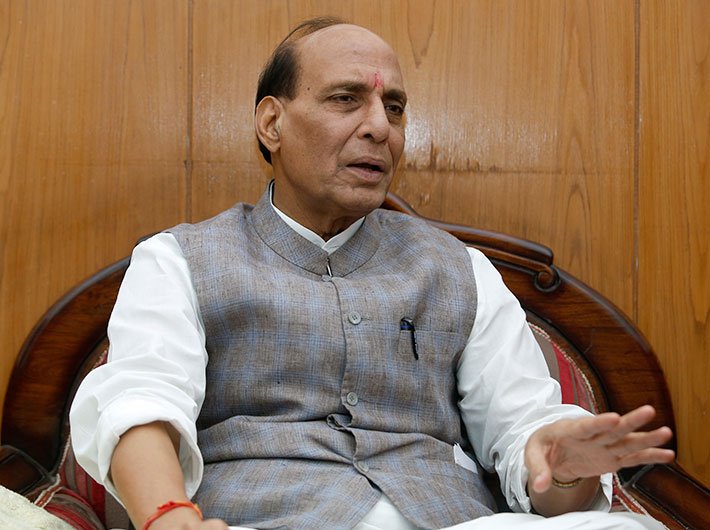Chew tobacco but shun beef. If utterances of senior ministers are to be believed, this is the message of the Narendra Modi government. Union home minister Rajnath Singh has gone a step further and promised to impose punitive prices of beef on Bangladesh by checking cattle-smuggling across the border.
In his latest visit to border security force (BSF) outposts in West Bengal, Singh exhorted jawans to check cattle-smuggling so people in Bangladesh would desist from eating beef. Ridiculous though it may sound, Singh, who aspires to be second only to the prime minister, is quite convinced of his logic: if cattle-smuggling is stopped, people in Bangladesh would not buy expensive beef and cows could be saved.
Singh should be credited for his ingenuity in devising a new scheme for promoting the Sangh Parivar’s agenda of protecting cows not only in India but also in a predominantly Muslim nation. But does the home minister know that over the years cattle-smuggling across the Indo-Bangladesh border has become an underworld economy of nearly Rs 1 lakh crore?
Singh is not so naïve as not to know these facts given his long experience as UP chief minister and as cabinet minister in the Vajpayee government. He must be aware that beef is a sensitive issue in the northeast region and West Bengal where a large population is dependent upon this cheap source of protein. Moreover, the eating habits can hardly be changed at the whims and fancy of rulers sitting in Delhi.
What is curious is the fact that in his own home state, Uttar Pradesh, Singh has not been able to ensure protection of cows though his party made it an emotive issue, particularly in western UP. In his meetings in Agra and other parts of western UP, Modi metaphorically described cow-slaugther as ‘pink revolution’. Since the NDA regime assumed charge, the union government’s inability to act on this issue has been a cause of discontent among activists of the Sangh Parivar.
In this context, Singh’s bravado of making cow protection in Bangladesh as his cause célèbre is not an as innocuous comment as it appears to be. He appears to be tapping the discontent within the Parivar to his own advantage.
In reality, Singh knows it too well that he would be as miserable in checking cattle-smuggling as his predecessors. On the other hand, his utterances are bound to have an adverse impact on bilateral relations with Bangladesh. There are several energy and transit projects in the northeast region which bank critically on the support of Bangladesh. Singh’s statement will create an irritant in the facilitation of these projects. But protecting cows from Muslims is worth more than projects critical for development of the northeast! That is what his political instincts tell him.
While cow protection seems to be at the top of the mind of the country’s home minister, union health minister JP Nadda appears keen to protect the tobacco industry instead of saving lives of millions. The union health ministry is reluctant to impose punitive regulation on tobacco consumption even though the health hazard of tobacco consumption is a proven fact. The ministry has taken the pretext of the parliamentary standing committee’s report which is sceptical of findings that tobacco consumption causes adverse affect on human health.
The obvious reason for this generous view of the health ministry is the political clout wielded by the tobacco lobby in the government. It is no secret that this lobby was considered to be instrumental in Dr Harsh Varshan’s exit from the health ministry as he had initiated strict measures to control the sale of tobacco products. The fact that tobacco is internationally recognised as a mass-killer is conveniently ignored by the health ministry. The underlying message is quite evident: human lives are expendable but cow protection is sacrosanct, at least in rhetoric.

